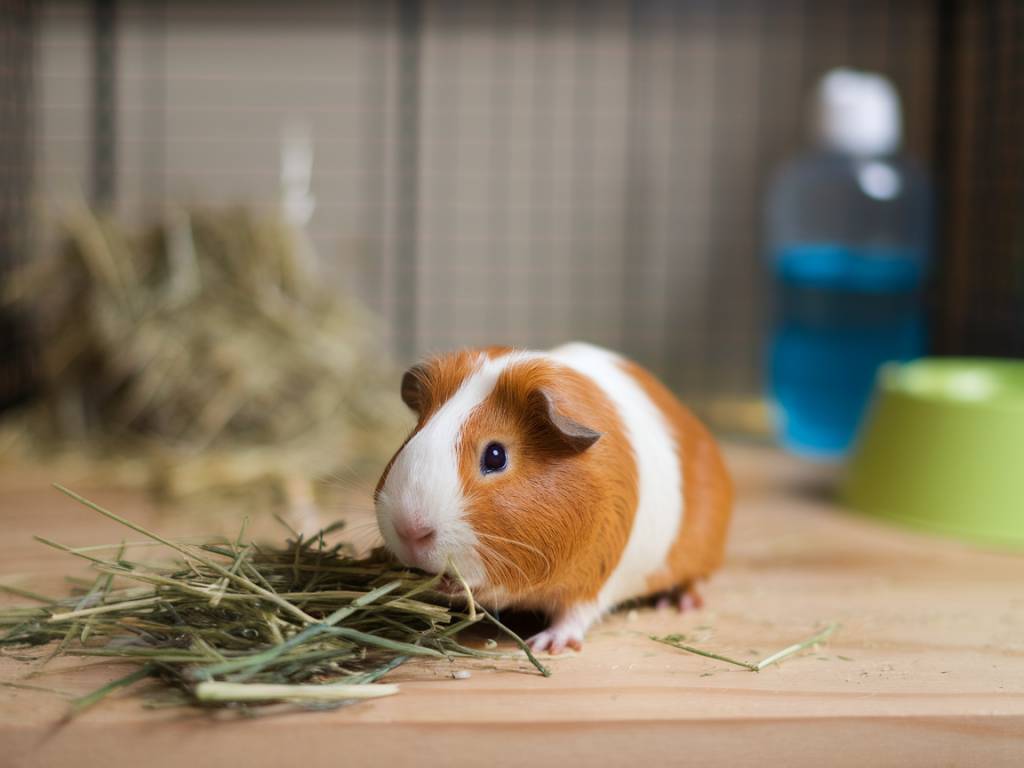Guinea pigs, also known as cavies, are charming little creatures that rely heavily on a well-balanced diet to maintain their health and vitality. As small herbivores, their dietary needs are quite specific, and one of the most crucial aspects of their diet is fiber. High-fiber diets play a significant role in supporting their digestive health and overall well-being. In this article, we will explore the benefits of high-fiber diets for guinea pigs and provide guidance on how to ensure your furry friend receives the fiber they need.
Understanding the Digestive System of Guinea Pigs
Before diving into the benefits of fiber, it’s important to understand the unique digestive system of guinea pigs. These animals are hindgut fermenters, meaning that their digestive system is specifically adapted to break down fibrous plant material in the large intestinal tract. This process relies on a healthy population of beneficial bacteria in the gut. Without sufficient fiber, the delicate balance of these bacteria can be disrupted, leading to digestive issues.
Guinea pigs have an unusual digestive process known as caecotrophy, where they consume cecal pellets—soft droppings that are a rich source of nutrients. This process allows them to absorb essential nutrients more efficiently. Fiber plays a pivotal role in promoting the production of these beneficial pellets.
The Role of Fiber in Digestive Health
Fiber is an indigestible plant component that is crucial for promoting healthy digestion in guinea pigs. It comes in two forms: soluble and insoluble. Both types have benefits, but insoluble fiber is particularly important for guinea pigs.
- Stimulates Gut Motility: Fiber acts as a natural laxative by adding bulk to the diet, helping to move food through the digestive tract smoothly. This is critical for preventing issues like gastrointestinal stasis, a potentially life-threatening condition where the gut slows down or stops moving altogether.
- Balances Gut Flora: A diet rich in fiber encourages the growth of beneficial gut bacteria. These bacteria aid in digestion and produce fatty acids, which are important energy sources. By maintaining a healthy gut flora, fiber helps prevent the overgrowth of harmful bacteria.
- Prevents Obesity: High-fiber foods are usually low in calories, which can help prevent your guinea pig from becoming overweight. Maintaining a healthy weight is essential for preventing various health issues, including heart disease and diabetes.
Types of High-Fiber Foods for Guinea Pigs
To provide your guinea pig with a balanced diet rich in fiber, you should focus on offering a variety of appropriate foods. Here are some of the best fiber-rich options for your pet:
- Hay: The staple of a guinea pig’s diet should be high-quality hay, such as Timothy hay, orchard grass, or meadow hay. This should be available to them at all times. Hay provides the necessary fiber for gut health and supports dental health by wearing down their continuously growing teeth.
- Fresh Vegetables: Offer a selection of fresh, leafy greens like romaine lettuce, kale, and cilantro. These not only provide fiber, but also important vitamins and minerals. Be cautious with vegetables high in calcium, like spinach, which should be fed in moderation.
- Pellets: Choose high-quality guinea pig pellets that contain a balanced ratio of fiber, protein, and other nutrients. Ensure that the pellets are specifically formulated for guinea pigs and do not contain artificial colors or sugars.
Avoiding Common Mistakes
While providing a high-fiber diet seems straightforward, there are common pitfalls that owners should be aware of:
- Overfeeding Fruits: Many fruits are low in fiber and high in sugar, so they should be given sparingly as treats. Excessive sugar can disrupt gut flora and contribute to obesity.
- Lack of Variety: Relying solely on one type of vegetable or hay can lead to nutrient deficiencies. Offering a diverse selection of fibrous foods will ensure a well-rounded diet.
- Improper Pellet Selection: Not all pellets are created equal. Some may be formulated primarily as a treat and lack the necessary fiber content. Always read labels carefully to choose the right pellets.
Observing Changes and Seeking Veterinary Advice
Regular observation of your guinea pig’s eating habits and droppings can provide insight into their digestive health. Changes in appetite, weight, or fecal consistency could indicate a problem. It’s crucial to introduce dietary changes gradually to avoid gastric distress.
If you notice any signs of digestive issues, such as bloating, diarrhea, or a sudden drop in appetite, consult with a veterinarian experienced in guinea pig care without delay. Early intervention can make a significant difference in their health outcomes.
Incorporating Fiber into Your Guinea Pig’s Diet
In order to successfully incorporate high-fiber foods into your guinea pig’s diet, consider the following tips:
- Consistency is Key: Make hay the foundation of their daily diet and supplement with vegetables and pellets as needed.
- Rotate Veggies: Regularly rotate the variety of greens and vegetables to provide a balanced diet rich in different nutrients.
- Monitor Hay Quality: Store hay in a cool, dry place to maintain its freshness and prevent mold.
In summary, high-fiber diets are essential for the digestive health of guinea pigs, helping to promote gut motility, maintain balanced gut flora, and prevent obesity. By providing a well-rounded diet rich in fiber from hay, vegetables, and pellets, along with prudent monitoring and professional advice when needed, you can ensure your guinea pig thrives. Remember, a content and healthy guinea pig is one that will bring joy and companionship for years to come.
Thank you for taking the time to learn about the importance of fiber in the diet of guinea pigs. Your pets count on you for their well-being, and with the right diet, they can lead a fulfilling and healthy life. Stay tuned for more tips and advice on pet care. Until next time, this is Lisa Tissed signing off.

